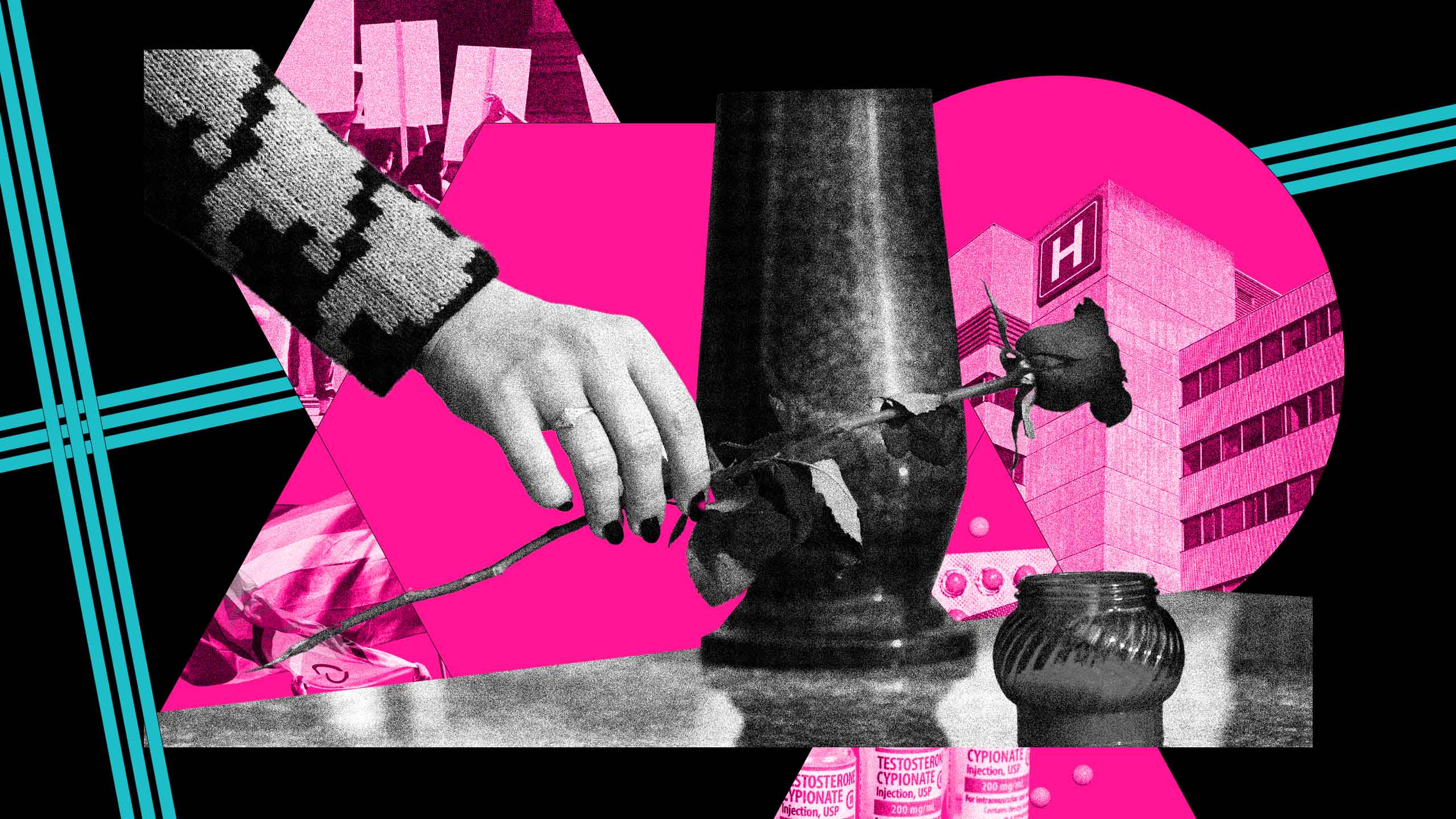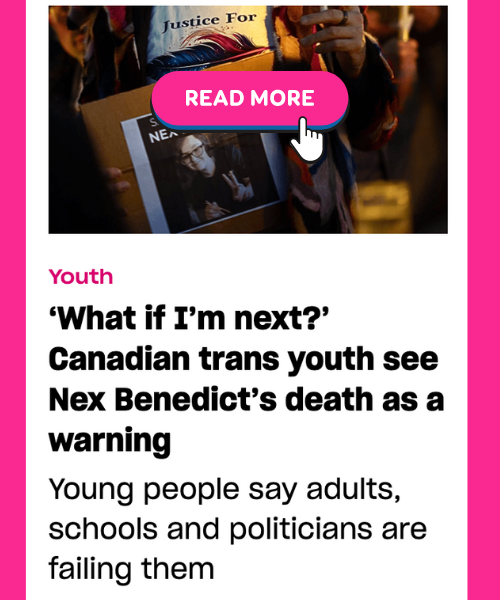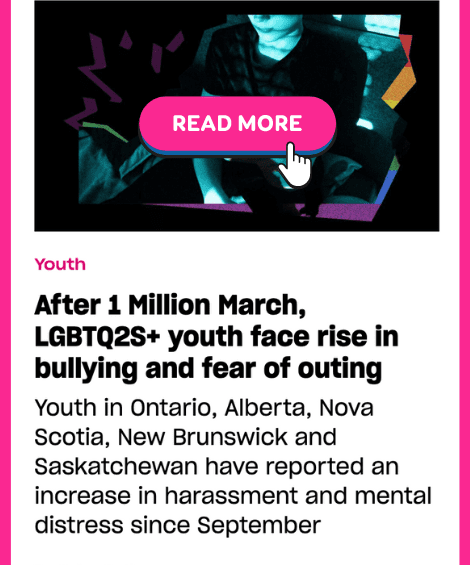It wasn’t supposed to be like this. It’s an absurd thought that feels almost shamefully naive, but it keeps returning to me as I search for the words to open this piece. It was not supposed to be like this. We are not, in 2024, supposed to be living in a world where young people are losing their lives to transphobia and bigotry. The first time I wrote an essay for a newspaper about a murdered trans youth was over ten years ago, when I was a youth myself, and I suppose a part of me never thought that I’d still be doing it a decade later.
Yet here we are: Still trying to pick up the pieces, to speak about unspeakable losses in a way that feels meaningful. Still trying to answer questions that feel unanswerable: How do we mourn people that we’ve never met, yet feel inextricably connected to? How do we honour the dead without appropriating their stories? All the while, around us, the roar of anti-trans moral panic grows louder and louder, pervading social media and political discourse, building to a fever pitch.
Trans communities have been flooded with deeply disturbing news about violence toward youth and children over the past several weeks. On March 17, a 21-year-old trans man named Alex Franco was shot to death in Utah. A few days earlier, on March 21, the district attorney of Tulsa County had announced that no charges would be filed regarding the death of Indigenous non-binary teenager Nex Benedict, who reportedly died of suicide following a physical altercation during which they were allegedly attacked by three fellow students in a bathroom in their public high school.
In moments like this, I feel the impulse to lean into familiar stories, the instinctive urge to fall back on a world view predicated upon victims, villains, the longing for retribution. This is the only language that this culture has given me to make meaning from the unspeakable. Perfect victims, unforgivable villains, justice in the form of stronger laws and prison sentences. Is this what I am to believe in? Like many trans people, I came so close to being one of the youth who died too young. It’s so personal and so painful. I understand the move toward oversimplification—yet I cannot believe it serves the dream of a more just world for children to live in.
Back in February, the news of Benedict’s death sent shock waves of grief and outrage through queer and trans social networks, following closely on the heels of a trial in the United Kingdom of the murderers of a 16-year-old trans girl named Brianna Ghey. The trial revealed that Ghey’s killers had been shockingly brutal, stabbing her 28 times with a hunting knife after luring her to a meeting in a park. Each one of these horrifying events is in itself a terrible loss, a complex and painful story that deserves its own remembrance. Taken together, they have become inextricable from the larger narrative in which as trans people find ourselves presently entangled: a social panic that exploits us as scapegoats and political pawns—and that ultimately results in real violence against us. Trans people, and especially trans children and youth, have become a wedge issue exploited by populists and profiteers who know that the best way to whip up support from their followers is to give them an enemy to unite against.
Canadian Conservative leader Pierre Poilievre demonstrated this time-honoured strategy when he declared last month that “biological males” (that is, trans women) should be banned from public facilities such as change rooms and washrooms designated for women. So did Oklahoma education superintendent Ryan Walters when he appointed notoriously anti-trans TikTok influencer Chaya Raichik to serve on a media advisory committee for the state school library system—a move that many queer and trans journalists and media commentators have cited in reporting on Nex Benedict’s death, given that Benedict lived in Oklahoma.
Politicians like Poilievre and Walters are undoubtedly aware of what they stand to gain from taking such public stances against trans rights: support from a growing and extremely vocal “gender critical” movement that has taken hold in many conservative and centrist circles. For people like them, the war over trans rights might be strategic or ideological, a series of battles in a larger culture war.
Yet for the families of trans and gender-diverse children, and for trans people themselves, the impact is immense and personal beyond measure. Bombarded with stories of violence, death and loss, surrounded by an inescapable and seemingly incessant debate about trans human rights, we are a population engulfed in collective trauma.
Trans people have been culturally associated with violence, early death and false accusations of sexual perversion since long before Nex Benedict, Alex Franco and Brianna Ghey were born. While it goes without saying that each of these youth was a unique individual with a unique life story, it is impossible for many—perhaps most—trans people today to engage with those stories without immediately connecting them to a litany of other, similar stories of friends and loved ones and community members ripped from us before their time. To remember them is to feel each of their names like a punch in the gut.
It seems that to live as a trans person in 2024, nearly a decade after the so-called “Trans Tipping Point,” still means carrying the weight of a collective trauma that mainstream society does not understand and refuses to perceive. If there is a cultural stereotype that trans communities are overly prone to radical activism and political confrontation, perhaps this is why: We are drowning in the narratives of dead friends and dead children, and it is psychologically and spiritually unbearable. How could we not demand justice?
“It is frighteningly easy to make martyrs out of the dead, to turn them into political symbols when in fact they are people.”
In the wake of tragedy, it only makes sense to respond by calling for a world in which such things never happen again. Yet there is always something about this impulse that is confusing and complicated, that makes the writer in me falter where my activist self wants to rush forward.
It is frighteningly easy to make martyrs out of the dead, to turn them into political symbols when in fact they are people. This is especially true of children who have died under violent circumstances. Conservatives and transphobes do this all the time, weaponizing the notion of childhood to forward adult agendas—this is in fact a key element of transphobic and homophobic political campaigns where, for example, sex education or queer literature are banned in the name of “protecting kids.”
Queer and trans advocates and writers can do better, by refusing to give in to the temptation to make martyrs of our dead youth—by resisting the temptation to erase the complexities of their lives and deaths in order to serve our political ends. It would be easy for queer and trans advocates to project our own life stories on to young people like Benedict, Franco and Ghey, and understandably so. However, it is essential that we also remember them as individuals with interior lives that most of us can only guess at. They aren’t poster children in the struggle for trans rights. They were and are so much more than that.
Public grieving and public mean-making call for a commitment to complexity, a commitment to honouring the full humanity of those we grieve—even when their stories do not align perfectly with our preferred narratives. For example, there has been much pushback in some parts of the queer community over whether Nex Benedict died by suicide or as a result of injuries sustained in the attack he suffered, which were fuelled by ambiguities in the autopsy report—several head injuries were listed in the document, but according to the report, Benedict’s cause of death was a lethal combination of antidepressants and antihistamines. The truth is important. Yet I must ask: Would it not be equally tragic, equally deserving of a call to justice, either way? Would we mourn a death by suicide any less? Surely not.
Some might argue that Benedict was bullied to suicide, which certainly seems like a distinct and terrible possibility that must be considered. A commitment to complexity means that we cannot be sure of the answer, and I believe that staying in the question is a part of honouring his humanity, because Benedict is worth grieving without having to know for certain why he died. The loss of his life, and everything he could have been, is unbearable regardless.
It is also important to observe how in the surge of justified anger over transphobic violence directed toward children, progressive movements can be inclined to call for accountability and protective measures that are not aligned with progressive principles—and that may actually result in greater harm to trans children and youth overall. In the wake of the sentencing of Brianna Ghey’s killers, for example, the U.K. media has largely chosen to focus on covering her mother’s campaign for greater restrictions on and monitoring of youth social media and cellphone use. As Eli Cugini and Ilya Maude reported for Xtra, such initiatives could potentially be devastating for trans young people living in abusive families.
An even more emotionally fraught, yet extremely important, question is how we are to understand calls for perpetrators of violence against trans youth—who are often youth themselves—to face criminal charges and prison time? Is this the meaning of justice? I cannot believe that this is the case. Writer and Xtra columnist Jude Ellison S. Doyle seems to agree, writing recently in his newsletter: “[J]ustice doesn’t mean blood, and it doesn’t mean vengeance. It means making sure that Nex Benedict’s life matters.”
What does it mean to make the lost life of a child matter? In the first place, it bears saying that it always matters. In the second, it means reflecting deeply on the structural factors that allow such unthinkable things to happen so frequently in the first place—factors like the lack of universal mental healthcare and under-resourced public schools, like a political system built around cronyism and cheap culture war pandering rather than meaningful public participation and the collective good.
A queer view of the world invites us to reach beyond the punitive impulse, to ask ourselves if the call for revenge really serves our intention of breaking the cycle of harm. Does putting people in jail, expanding the power of the criminal court, protect young people from violence? I do not think so, because violence is not an individual problem. It is a systemic one that requires systemic solutions.
We are not supposed to be living in this world. Brianna Ghey and Alex Franco and Nex Benedict were never supposed to die in it. They deserved a better world—and so did all the queer and trans youth who came before them, all the queer and trans youth still alive today, and all those coming next. Let us honour them by building a better one.




 Why you can trust Xtra
Why you can trust Xtra


